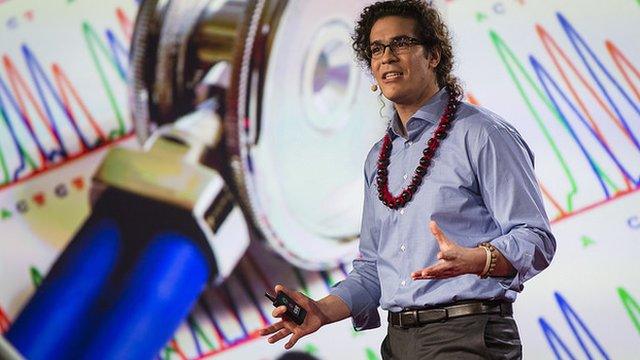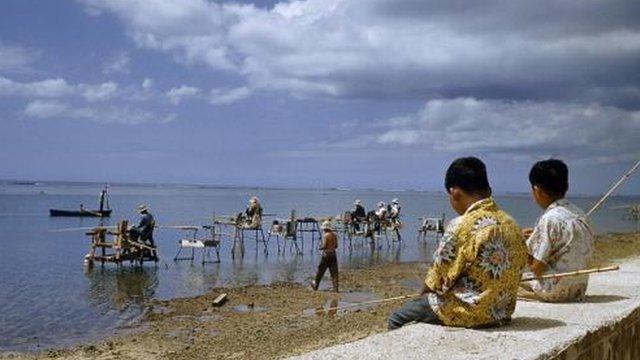TED 2016: The man making genes democratic
- Published

Keolu Fox is hoping to offer insights into the health issues of indigenous groups
Keolu Fox is a man on a mission - he wants to overhaul the study of genes, which is increasingly revolutionising medicine, and find out why Polynesians and other indigenous groups are dying at faster rates than many other groups.
As a native Hawaiian, he has special interest in the second and as a medic is shocked by the fact that most of those who have so far contributed to the study of human genes are of European descent.
The Human Genome Project, which set out to identify and map all of the genes in a human body was completed in 2003 and since then there has been an explosion in the way medicine has used genetic sequencing to help treat and identify diseases.
"I started to study those things and I noticed some staggering trends. 96% of people who have their genes sequenced are of European ancestry," said Mr Fox.
"That means that the future of medicine, moving towards using genome sequencing as a tool for prediction, prevention and personalisation of disease and treatments is not going to include minority people. You begin to set the scene for social stratification, and the gap in health disparities will widen."
Mr Fox, who is a fifth year PhD student at University of Washington, is at TED (Technology, Entertainment and Design) to talk about his new project IndiGenomics and he is particularly excited about a small box that he pulls out of his pocket on the stage.
The MinION, a palm-sized gene sequencer made by UK-based Oxford Nanopore Technologies, might not seem like the sort of shiny gadget that people would shout about.
But then most of the audience at the TED conference are not geneticists.
"I had a genome sequencer delivered to my house. Stop and think about how remarkable that is. No other time in history have we been able to democratise genomics in this way," Mr Fox tells the BBC.
He and his team aim to go out into the community with their mobile gene testers.
"We are de-blackboxing the technology - bringing it into the community, so that there is an understanding of how it works. Because of remote access to the internet, you can have a genome centre in your backpack.
"One of the first services of IndiGenomics will be a tribal consultation resource for indigenous groups. We will be educating indigenous communities about the potential use and misuse of genetic information with the hope that we begin to democratise genome sequencing so that indigenous people are partners not subjects of gene research," he said.
High risk
This work is crucial as indigenous populations often have unique health issues, some of which are down to cultural and societal influences but some of which may be genetic.

Hawaii has higher than average numbers of its native population with Type 2 Diabetes
Polynesians, including Hawaiians, are more likely to suffer from Type 2 diabetes and obesity for example, while native Hawaiians die, on average, a decade earlier than their non-native counterparts.
"We want to understand the root cause of disease and your genome contributes to it" said Mr Fox.
There has been a long history of genetic research into indigenous communities but not all of it has gone down well.
"The reason that indigenous communities are wary of engaging Western research organisations is a history of mistrust," he said.
One of the most famous examples of this is a 1990s Arizona State University study of the North American Havasupai tribe.
"They took blood samples to alleviate Type 2 diabetes and then used those samples to assess schizophrenia, inbreeding and migration patterns which challenged their origin stories. The community were furious," said Mr Fox.
They successfully sued the university for $700,000 and banned the researchers from their land.
Vence L Bonham, a senior adviser at the US National Human Genome Research Institute agreed that "most genomic studies involve European ancestral populations" and that previous studies of indigenous populations have not always worked out well.
"One of the causes of the distrust are researchers, who conduct "helicopter research" where biological samples and health information are taken from the community, and there is no benefit to improving the health of the tribe or continued engagement with the tribe to provide information to the communities that participated in the research," he said.
He added that the organisation was "seeking to enhance the participation of ancestral diverse populations in genomics research including American Indian and Alaska Native communities if they desire".